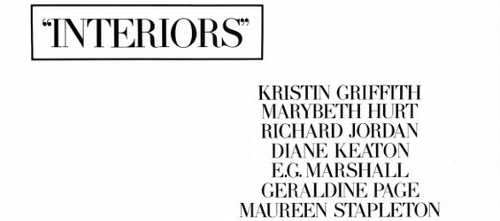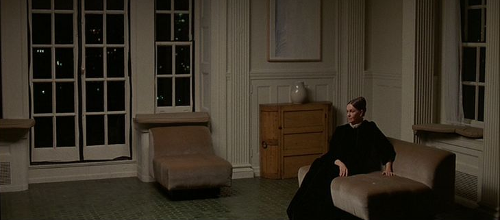

 | Dir: Woody Allen
| Dir: Woody Allen
“Its been such a long time since I made love to a woman that I didn’t feel inferior to.”
An early scene in Interiors sees E.G. Marshall’s Arthur speak to his wife Eve (Geraldine Page) and two of his three daughters (Diane Keaton as Renata and Mary Beth Hurt as Joey) over Sunday breakfast. He’s been thinking long and hard. He’s been soul searching. After paying his dues as a responsible father and loving husband, he finally feels he has the freedom to make a revocable decision – to spend some time on his own. This revocable decision mirrors Woody Allen’s own in pursuing one of his true passions: a serious drama, which he had wanted to do since writing a draft of The Jazz Baby following Take the Money and Run. He didn’t know how he would feel making a dramatic film until it happened. Following the success of Annie Hall, he had all the cards to play with the studio to find out.
It certainly can’t be seen as an easy decision for Allen at the time, eventually realising that he was “breaking my contract” with his fans. The irony is that unlike Arthur, who made his decision irrevocable by seeking a divorce and remarrying (to a woman the exact opposite of Eve -Maureen Stapleton’s colourful and vibrant vulgarian Peal), Allen has now built a reputation for the unknown with fans. You never know what kind of film he’s going to release next.
Yet if you saw Interiors at the cinema in 1978, you’d be forgiven for anticipating a punchline to the opening scene discussing how beiges and Earth tones make a more subtle statement on the large floor space of an open kitchen. Your experience of Allen to this point would give you no inclination to expect a sombre and sorrowful drama in the vein of Swedish director Ingman Bergman and Russian playwright Anton Chekhov, where Allen doesn’t even feature on screen. But you can wait all 88 minutes of this film and find no witty side remark to the camera or cartoonish payoff. Instead, this opening scene marks Allen’s artistic departure into a meditation on the complex behaviour and anxieties of the human being; their formation, their manifestation under dark conditions and how they can instigate such conditions over a lifetime.
It’s a testament not only to Allen’s versatility at jumping from parody to romantic comedy to intelligent family drama, but that of Ralph Rosenblum and Gordon Willis who both return from Annie Hall. They seamlessly shape-shift genres and guide the still young filmmaker in his evolution, capturing moments of tragedy with as much poise as they had with machine gun witticisms. Willis’ tracking shots, in particular Eve’s breakdown in the church and the sisters walking along the beach, add such striking dimensions to these moments which Allen has written and the actors have played.
What playing it is by Diane Keaton, who effortlessly swoops from Annie’s comic timing to Renata’s cold artist angst and is equally excellent at both. That she wasn’t nominated for an Oscar while two of her cast members were highlights the quality on screen. Geraldine Paige won a BAFTA for her wonderful performance. She delicately balances fragility and hostility as the immaculate ice palace that she’s erected around herself melts into extinction, like her mental state. She’s so expressive and truthful to the moment, often remarkable in her stoic shattering.
It’s not uncommon for Allen to depict New York intellectuals attempting to find meaning to their interconnected familial lives. But the presence of dramatic contexts gives Allen’s familiar motifs new shades and a truly raw complex: Eve’s domineering mother role (inspired partly by Louise Lasser’s mentally unstable mother); Renata being overcome by feelings of her mortality (“I can’t seem to shake the real implication of dying. It’s terrifying”) and inability to satisfy her ambitions; Joey’s directionless character containing so many feelings and a need to express something, but not knowing what that is or how to express it (which rebirthed via Scarlett Johansson in 2008’s Vicky Cristina Barcelona); and Frederick’s inadequacy and resentment at his marriage. The light-heartedness of Allen’s broad body of work belies how truly serious and personally candid the themes he tackles are.
Allen is unexpectedly restrained here, not only in the direction but also in choosing not to cast himself. This wasn’t done because he wanted to devote himself entirely behind the screen in this new venture, but because he knew his limitations as an actor. This would mark the end of Allen writing purely as a vehicle to forward his own stage act. His admiration for Bergman is obvious from reading any interview and most notable until now in the self-conscious homages in Love and Death. But Allen has no narcissism about his first foray into the dramatic world, which is similar to his views on much of his canon – it was “an interesting failure” and “what I wanted to do and the best I could do at the time”. If he were to remake it, he would make it more fluid and fun for the audience: warm up the cool tone, introduce Peal earlier on, loosen the static cinematography, make the dialogue more colloquial.
But Allen is too harsh on his work as usual. You understand every well constructed narrative beat, you appreciate each precisely formed line of dialogue, you invest in the heavy and chilly tone, you marvel at all the turtleneck jumpers (courtesy of costume designer Joel Schumacher). Although it never becomes quite as affecting or pathos driven as I think Allen would like it to.
Part of Woody Wednesday. First viewing.

Pingback: STARDUST MEMORIES (1980) | POPCORN SCORN
Pingback: HANNAH AND HER SISTERS (1986) | POPCORN SCORN
Pingback: SEPTEMBER (1987) | POPCORN SCORN
Pingback: Sweet and Lowdown (1999) | POPCORN SCORN
Pingback: ANNIE HALL (1977) | POPCORN SCORN